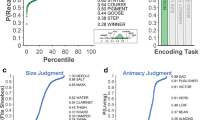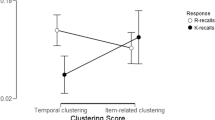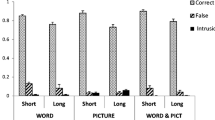Summary
Subjects encoded homographs (e.g., iron) in one of two contexts, produced by preceding them with words from two different categories to which the item belonged (e.g., items that were metals or utensils). Later, subjects were tested either under free-recall conditions, or with one or the other of the category names that were either congruous or incongruous with the original encoding of the targets. Recall with cues that were congruous with the encoding of the target produced performance superior to free recall, but free recall was superior to cued recall when the cues were not congruous with the original encoding. The results were interpreted within the encoding specificity framework, in particular as confirming the debated proposition that a cue strongly associated to a target item may be ineffective in promoting retrieval of the target if the relation was not encoded when the target was studied. Previous failures to confirm this prediction may have been due to inadequate manipulation of the encoding context in order to provide distinctive encodings.
Similar content being viewed by others
References
Baker L, Santa JL (1977) Context integration and retrieval. Memory & Cognition 5:308–314
Barclay JR, Bransford JD, Franks JJ, McCarrell NS, Nitsch K (1974) Comprehension and semantic flexibility. J Verbal Learning and Verbal Behavior 13:471–482
Bower GH (1970) Organizational factors in memory. Cog Psychol 1:18–46
Fisher RP, Craik FIM (1977) Interaction between encoding and retrieval operations in cued recall. J Exp Psychol Hum Learn 3:701–711
Flexser AJ, Tulving E (1978) Retrieval independence in recognition and recall. Psychol Rev 85:153–171
Light LL, Carter-Sobell L (1975) Effects of changed semantic context on recognition memory. J Verbal Learning and Verbal Behavior 9:1–11
Martin E (1975) Generation-recognition theory and the encoding specificity principle. Psychol Rev 82:150–153
Morris CD, Bransford JD, Franks JJ (1977) Levels of processing versus transfer appropriate processing. J Verbal Learning and Verbal Behavior 16:519–534
Neely JH, Payne DG (1983) A direct comparison of recognition failure rates for recallable names in episodic and semantic memory tests. Memory & Cognition 11:161–171
Newman SE, Cooper MH, Parker KO, Sidden JA, Gonder-Frederick LA, Moorefield KM, Nelson PA (1982) Some tests of the encoding specificity and semantic integration hypotheses. Am J Psychol 95:103–123
Newman SE, Frith U (1977) Encoding specificity vs associative continuity. Bull Psychon Soc 10:73–75
Postman L (1975) Tests of the generality of the principle of encoding specificity. Memory & Cognition 3:663–672
Roediger HL (1973) Inhibition in recall from cueing with recall targets. J Verbal Learning and Verbal Behavior 12:644–657
Roediger HL, Adelson B (1980) Semantic specificity in cued recall. Memory & Cognition 8:65–74
Thomson DM (1972) Context effects in recognition memory. J Verbal Learning and Verbal Behavior 11:497–511
Thomson DM, Tulving E (1970) Associative encoding and retrieval: Weak and strong cues. J Exp Psychol 86:255–262
Tulving E (1974) Cue-dependent forgetting. Am Sci 62:74–82
Tulving E (1983) Elements of Episodic Memory. New York: Oxford
Tulving E, Osler S (1968) Effectiveness of retrieval cues in memory for words. J Exp Psychol 77:593–601
Tulving E, Thomson D (1973) Encoding specificity and retrieval processes in episodic memory. Psychol Rev 80:352–373
Tulving E, Watkins OC (1977) Recognition failure of words with a single meaning. Memory & Cognition 5:513–522
Author information
Authors and Affiliations
Rights and permissions
About this article
Cite this article
Roediger, H.L., Payne, D.G. Superiority of free recall to cued recall with “strong” cues. Psychol. Res 45, 275–286 (1983). https://doi.org/10.1007/BF00308707
Received:
Issue Date:
DOI: https://doi.org/10.1007/BF00308707




